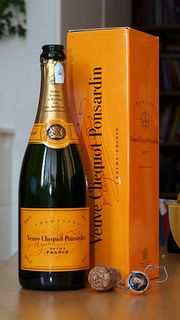TTABlog Test: Is VEUVE OLIVIER for Sparkling Wines Confusable with VEUVE CLICQUOT for Champagne?
Petitioner MHCS sought cancellation of a registration for the mark VEUVE OLIVIER for sparkling wines, claiming a likelihood of confusion with the registered mark VEUVE CLICQUOT for champagne. Priority was not an issue because MHCS filed its underlying application first. The Board found the goods to be, in part, legally identical, since champagne is a type of sparkling wine. But what about the marks? How do you think this came out? MHCS v. Les Grands Chais De France, Cancellation No. 92075021 (March 8, 2024) [not precedential] (Opinion by Judge Martha B. Allard).

As to the conceptual strength of the cited mark, since the mark is registered on the Principal Register without a claim of acquired distinctiveness, it is presumed to be inherently distinctive. Furthermore, the word "veuve" (meaning widow) "is an arbitrary term as applied to Champagne and therefore is conceptually strong."
With regard to commercial strength, MHCS has used the mark VEUVE CLICQUOT in the United States since 1994. VEUVE CLICQUOT brand champagne is sold everywhere in the United States, through both online and in more than 50,000 brick-and-mortar stores. The mark has been widely advertised and promoted, has enjoyed high sales for the years since 2011, and has been the subject of numerous unsolicited media references. However, MHCS did not provide sales or advertising figures for the VEUVE CLICQUOT mark alone, but rather as to total figures for all of its “VEUVE Marks.”
The Board concluded that "overall the mark has substantial commercial strength and falls on the stronger side of the spectrum from very strong to very weak."
Turning to the marks, each of the marks could connote "a specific widow, i.e., the widow named Clicquot and the widow named Olivier." The Board found that "an appreciable number of purchasers are unlikely to be aware that VEUVE means 'widow' and are unlikely to translate the marks into English."
The slight difference in the “widow” connotations of the respective marks in translation, i.e., “the Widow Clicquot” versus “Widow Olivier,” would likely be lost on these purchasers, and it will not aid such purchasers in distinguishing the marks. They will perceive only that the same French-looking and French-sounding word, VEUVE, appears as the first term in both.
MHCS provided evidence that it has made VEUVE "a theme of its marketing efforts because of the history, and the widow Clicquot herself, connected with the origins of the company." "The presence of this strong distinctive term as the first word in each party’s mark further substantiates the marks' similarities."
Viewing the marks in their entireties in terms of sight, sound, meaning and commercial impression, we find that the marks are similar due to the shared initial term VEUVE. This shared dominant element outweighs the specific points of dissimilarity between the marks due to the terms that follow, i.e., CLICQUOT and OLIVIER.
And so, the Board granted the petition for cancellation.
Read comments and post your comment here.
TTABlogger comment: Do you think consumers would be confused? Respondent did not submit any evidence or testimony, nor did it file a brief. That rope-a-dope strategy didn't work. Would the lack of actual confusion over 8 years of coexistence have been a fertile ground for exploration?
Text Copyright John L. Welch 2024.





2 Comments:
I don't think consumers of high end wines and spirits would be confused.
One does not have to be a "high end" consumer to see the actual difference between the two marks, and one can rightly assume that a consumer will also ask especially if there is a price difference between them. I respectfully disagree with the decision.
Post a Comment
<< Home